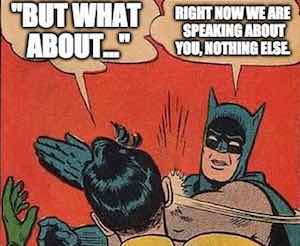By BombThrowers -- Eli David——Bio and Archives--July 13, 2017
American Politics, News | CFP Comments | Reader Friendly | Subscribe | Email Us
 NPR, other left-wing sources, and even some conservative columnists, have discovered a grave new danger coming from the always dangerous President Trump.
Trump, they claim, "has developed a consistent tactic when he's criticized: say that someone else is worse." This dreaded tactic is labeled the doctrine of "whataboutism," which is described as:
NPR, other left-wing sources, and even some conservative columnists, have discovered a grave new danger coming from the always dangerous President Trump.
Trump, they claim, "has developed a consistent tactic when he's criticized: say that someone else is worse." This dreaded tactic is labeled the doctrine of "whataboutism," which is described as:
Party A accuses Party B of doing something bad. Party B responds by changing the subject and pointing out one of Party A's faults--"Yeah? Well what about that bad thing you did?" (Hence the name.)In an NPR article, writer Danielle Kurtzleben points out that Trump is following in the footsteps of...the Russians (GASP!), and President Vladimir Putin, and before them, their predecessors the Soviet communists. According to NPR, the risk is that:
Whataboutism flattens moral nuances into a black-and-white worldview. But in this worldview, it's very difficult to be the good guy; idealism is the ultimate naIveté, and anyone who dares to criticize another can be "unmasked" as a hypocrite. This creates a useful moral equivalency...if nobody is perfect, there's license to do all sorts of imperfect things.Now, pardon me for engaging in this dreaded tactic myself, but President Trump is far from the first politician, or even the first president, to use whataboutism. President Obama loved to engage in it. Near the end of his first two years in office, when many Republicans were complaining about excessive spending and poor economic stewardship coming from the fully Democrat-controlled federal government, you may remember him bloviating, "after they drove the car into the ditch, made it as difficult as possible for us to pull it back, now they want the keys back," Obama said of the GOP. "No! You can't drive. We don't want to have to go back into the ditch. We just got the car out." Aside from domestic politics, President Obama also engaged in whataboutism to defend radical Islam from its (supposedly) Christian critics, "and lest we get on our high horse and think this is unique to some other place, remember that during the Crusades and the Inquisition, people committed terrible deeds in the name of Christ. In our home country, slavery and Jim Crow all too often was justified in the name of Christ." It's not just politicians who resort to whataboutism. Here is PBS fact-checking Republican critics of President Obama and his military and defense spending. Notice that in the very first part of the fact check, where PBS defends President Obama's record, it does so by comparing Obama's military and defense spending to that of President George W. Bush. Isn't this whataboutism? Shouldn't NPR be critical of its associate, PBS, as well?
View Comments
Bombthrowers is a blog about politics and the war for the hearts and minds of Americans from a conservative viewpoint.
In line with our name, we do not hold back. We have a take-no-prisoners attitude when it comes to fighting for conservative principles. The Left doesn’t play nice, and that’s why they’ve been winning. It’s time for conservatives to rise up and turn the tide.
We’re not afraid to take on anyone, especially the Washington Establishment—Republican or Democrat.
Bombthrowers is a project supported by the Capital Research Center. Its editor-in-chief is Matthew Vadum.